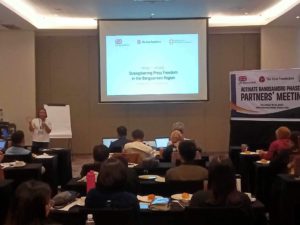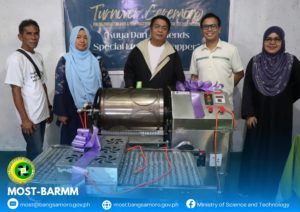
Philippines: A teenage detainee reconnects with his family through Red Cross messages

Bryan*, an 18-year-old detainee at the General Santos City Jail in South Cotabato, Philippines, had a simple desire – he wanted to somehow contact his adoptive mother and tell her, “Do not worry. I am okay.” His wish came true in a way that he had not expected.
A former street vendor, Bryan last saw his mother and five siblings in 2021, when he left his home in Davao del Sur, to look for work opportunities in General Santos City. After dropping out of school, he found it hard to find a stable job in his home town. “Life is very difficult back home. I left because I wanted to find a job and not be a burden to my family,” he says.
Held in detention for about four months now, Bryan says he has been constantly thinking of his family. “When I was detained, my first thoughts were about my mother. I wondered how long I would be in jail and whether I would be able to see her again. I wanted her to know I was fine,” says Bryan, adding he knows how his family struggles to make ends meet and that it would be difficult for them to undertake the five-hour journey from Davao del Sur.
Bryan learned about Red Cross messages, handwritten notes containing brief family or personal news, when a team from the International Committee of the Red Cross (ICRC) visited General Santos City Jail in September 2023. The ICRC, a humanitarian organization that works in places of detention for the welfare of people deprived of their liberty (PDL), facilitates exchanging Red Cross messages to help reconnect separated families. The ICRC works closely with its partner, the Philippine Red Cross (PRC), to ensure that the messages are delivered across the country.
When the ICRC team asked the detainees if they wanted to send messages to loved ones that they had lost contact with, Bryan seized the opportunity. He carefully wrote out a message to his mother and the ICRC worked with the Philippine Red Cross in Davao del Sur to deliver it to his family.
The search for Bryan’s mother
For Milo Michael Angelo Diel, a PRC volunteer since 2010, delivering the message to Bryan’s family was not easy. He knew Bryan’s village, but didn’t know exactly where his family lived. Nevertheless, Diel took on the challenge to deliver his first Red Cross message.
“We went to the barangay hall to ask for directions and happened to meet one of Bryan’s relatives! It was pure coincidence. That person served as our guide,” shares Diel, adding that they went through rice paddy fields and across streams to Bryan’s house, about three kilometres from the barangay hall.
“Bryan’s mother was very surprised to see us and even more surprised to receive the Red Cross message from Bryan. They hadn’t heard from him since he had left home. She also sent a Red Cross message back to him and told us that she would save up money to visit him at General Santos City Jail,” says Diel.
Diel handed the Red Cross message from Bryan’s mother to ICRC staff members, who then delivered it to Bryan. Overjoyed to get a message from his mother, he says he had to read the message twice for the words to register. “I feel much better after receiving my mother’s message. I am also happy that the Red Cross didn’t forget me,” says Bryan.
Talking to the ICRC staff who visited him, Bryan shares that he longs to be with his family for Christmas. “I hope I will be released soon. I want to return home and stay with my family in spite of the hardships. I miss the time I spent with them, sharing meals, listening to their advice, or working together on the farm,” he says.
Talking about the impact of Red Cross messages, Trishna Lama Vyas, head of the ICRC’s protection department in the Philippines, says, “Even during these digital times the Red Cross messages continue to be a very useful medium to reconnect families.”
Vyas adds that they hope Bryan and his mother will continue to remain in contact through the e-dalaw (e-visit) programme, where people deprived of their liberty can speak with family members using laptops and other devices.
(A story from the International Committee of the Red Cross. ICRC is working to protect and assist people affected by armed conflict and other situations of violence.)

